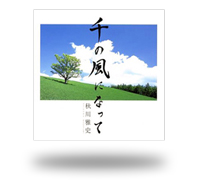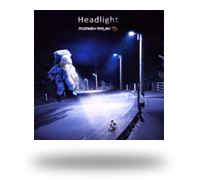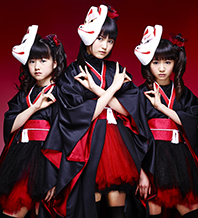千の風になって (A Thousand Winds)
About This Song

Title: 千の風になって
Lyrics Translation: 新井 満
Music: 新井 満
Song By: 秋川 雅史
Release Date: 24 May 2006
千の風になって (sen no kaze ni natte) is the biggest hit song in 2007 and the first No.1 ranked song performed by a classical music singer.
The lyrics of this song are the translation of well known English poem "Do Not Stand at My Grave and Weep". Japanese singer-songwriter 新井 満 (Man Arai) translated this poem into Japanese and composed the song. Tenor singer 秋川 雅史 (Masafumi Akikawa) made the song popular after performing it during the biggest year-end song festival on 31 December 2006.
This song is popular not only at the Karaoke places but also at the funeral. As in the West, the lyrics of this song have relieved grief and pain of many Japanese who have lost the loved ones.

Masafumi Akikawa - Official Site
Masafumi Akikawa - Wikipedia
Do Not Stand at My Grave and Weep
(original poem) - WikipediaMusic Video
See Karaoke Song Album page before you start.
Live Performance by Masafumi Akikawa
Karaoke with lyrics
Click here to view in larger size.
Lyrics


Meaning
Please note that song lyrics (and any art works) can have different interpretations.

Please do not weep in front of my grave.
| 私 watashi | I |
|---|---|
| ...の no | Particle which indicates possessive 私の watashino: my |
| お墓 ohaka | grave お o (Prefix indicating politeness) + 墓 haka: grave, tomb |
| ...の前で no mae de | in front of ...の no: of + 前 mae: front + で de: in (particle which indicates location) |
| 泣かないで ください nakanaide kudasai | Please don't weep. 泣く naku: to weep, to cry + ない nai: not (verb-negating suffix) + ください kudasai: please do for me |

I am not there. I am not sleeping.
| そこ soko | there |
|---|---|
| ...に ni | Particle which indicates location |
| 私 watashi | I |
| ...は wa | Particle which indicates the main topic of a sentence |
| いません imasen | I'm not there, I don't stay いる iru: to be, to stay + ません masen: not (verb-negating suffix, present form) |
| 眠ってなんかいません nemuttenanka imasen |
I'm definately not sleeping. 眠る nemuru: to sleep + なんか nanka: (indicates strong negation) + いません imasen: not ...ing (verb-negating suffix, present progressive form) |

A thousand winds. I became a thousand winds and am blowing across that open sky.
| 千 sen | thousand |
|---|---|
| の no | Particle which connects a noun with another noun. No particular meaning. |
| 風 kaze | wind |
| ...に ni | Particle which indicates the outcome of changes or transformation |
| なって natte | to become, and ... なる naru: to become ⇒ なって natte (Verb ending [て te] is used when two or more actions take place in succession) |
| あの ano | that |
| 大きな ōkina | big, large |
| 空 sora | sky |
| ...を o | Particle which indicates the object of a verb |
| 吹きわたっています fukiwatatte imasu |
I'm blowing across 吹きわたる fukiwataru: to blow across = 吹く fuku: to blow + わたる wataru: to go across + います imasu: ...ing (present progressive form) |

In autumn, I become a sunlight and fall onto farm lands.
| 秋 aki | autumn |
|---|---|
| に ni | in |
| ...は wa | Particle which indicates the main topic of a sentence |
| 光 hikari | light |
| ...に ni | Particle which indicates the outcome of changes or transformation |
| なって natte | to become, and ... なる naru: to become ⇒ なって natte (Verb ending [て te] is used when two or more actions take place in succession) |
| 畑 hatake | farm |
| ...に ni | Particle which indicates the destination of action |
| 降りそそぐ furisosogu | to fall onto 降る furu: to fall (e.g. rain) + そそぐ sosogu: to pour |

In winter, I become snowflakes sparkling like diamonds.
| 冬 fuyu | winter |
|---|---|
| ...は wa | Particle which indicates the main topic of a sentence |
| ダイヤ daiya | diamond |
| のように no yōni | like, similar to |
| きらめく kirameku | sparkling, glittering |
| 雪 yuki | snow |
| ...に ni | Particle which indicates the outcome of changes or transformation |
| なる naru | to become |

In the morning, I become a bird and awaken you.
| 朝 asa | morning |
|---|---|
| ...は wa | Particle which indicates the main topic of a sentence |
| 鳥 tori | bird |
| ...に ni | Particle which indicates the outcome of changes or transformation |
| なって natte | to become, and ... なる naru: to become ⇒ なって natte (Verb ending [て te] is used when two or more actions take place in succession) |
| あなた anata | you |
| ...を o | Particle which indicates the object of a verb |
| 目覚めさせる mezamesaseru | to awaken 目覚める mezameru: to wake up + させる saseru (Auxiliary verb indicating the causative) |

At night, I become a star and watch over you.
| 夜 yoru | night |
|---|---|
| ...は wa | Particle which indicates the main topic of a sentence |
| 星 hoshi | star |
| ...に ni | Particle which indicates the outcome of changes or transformation |
| なって natte | to become, and ... なる naru: to become ⇒ なって natte (Verb ending [て te] is used when two or more actions take place in succession) |
| あなた anata | you |
| ...を o | Particle which indicates the object of a verb |
| 見守る mimamoru | to watch over |

Please do not weep in front of my grave.

I am not there. I did not die.
| 死んでなんかいません shindenanka imasen |
I definately didn't die. 死ぬ shinu: to die + なんか nanka: (indicates strong negation) + いません imasen (verb-negating suffix, indicates continuous state) |
|---|

A thousand winds. I became a thousand winds and am blowing across that open sky.

A thousand winds. I became a thousand winds and am blowing across that open sky.

I am blowing across that open sky.
Related Topics
Karaoke Song Album - 逢いたくていま (aitakute ima) by MISIA
Karaoke Song Album - Dream Fighter by Perfume
Karaoke Song Album - Headlight by MONKEY MAJIK
Karaoke Song Album - コネクト (Connect) by ClariS































